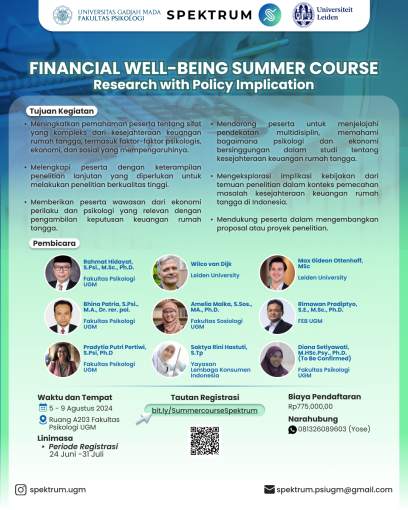
Introduction
Household financial well-being is a critical and timely topic for several reasons. First, it directly impacts the quality of life for individuals (Mathew et al., 2024) and their families. It influences their ability to meet basic needs, access healthcare and education, and ensure a comfortable living environment. When households experience financial stress, it can lead to a range of negative consequences, including physical and mental health problems, family conflicts, and a decline in overall happiness (Ryu & Fan, 2023). At the macro level, household financial well-being significantly impacts the overall economic stability of a country. Financially secure and stable households are more likely to contribute positively to the economy through spending, savings, and investments (Cashin et al., 2001). Conversely, financially stressed households may require social assistance or contribute to economic downturns during financial crises.
Data suggests that Indonesian households face financial challenges, evident through various indicators. Firstly, the savings-to-GDP ratio remains relatively low compared to Singapore and the Philippines (Setiawan, 2016). Secondly, there has been a significant increase in the volume of consumer loans provided by commercial banks between 2015 and May 2020 (Otoritas Jasa Keuangan, 2020). Thirdly, there has been a rise in non-performing loans (NPLs) from 2015 to May 2020, as reported by Otoritas Jasa Keuangan (2020). Moreover, in 2020, most Indonesian households experienced financial difficulties, with 74.3% experiencing a decline in income, 24.4% facing increased expenses, 51.5% lacking savings as a safety net, 27.3% having to pawn assets to survive, and 25.3% seeking informal financial assistance from friends or relatives (UNICEF et al., 2021).
Consequently, policymakers are increasingly interested in developing effective policies to enhance household financial well-being, including initiatives related to financial literacy, consumer protection, retirement planning, and social safety nets (OJK, 2021). Research in this area can inform evidence-based policy decisions to improve the financial well-being of citizens.
Objective of the Summer Course
- To enhance the participant’s understanding of the multifaceted nature of financial well-being, including the psychological, economic, and social factors that influence it
- To equip participants with advanced research skills necessary for conducting high-quality research skills necessary for conducting high-quality research.
- To provide participants with insights from behavioral economics and psychology that are relevant to household financial decision-making.
- To encourage participants to explore multidisciplinary approaches, understanding how psychology and economics intersect in the study of household financial well-being.
- To explore the policy implications of research findings in the context of solving household financial well-being problems in Indonesia.
- To support participants in developing research proposals or projects.
Course Outline
- August 5th : Introduction & Orientation
- August 6th : Approach and Theory
- August 7th : Research Approach & Measurement
- August 8th : Research in Practice and Policy Implications
- August 9th : Proposal Development & Research Collaboration
Time and Place
Date : 5-9 Agustus 2024
Place : Room A203, Faculty of Psychology Universitas Gadjah Mada
Organizing Comitte
SPEKTRUM (Studio Psikologi Ekonomi & Konsumen: Training – Research – Consumer Monitor) Faculty of Psychology Universitas Gadjah Mada
Aplication Period
Application submission is open until July 31st, 2024
Contact Person
081326089603 (Yose)
Further Information and Registration Form
Reference
Cashin, P., Mauro, P., Pattillo, C., & Sahay, R. (2001). Macroeconomic policy and poverty reduction.
Mathew, V., Santhosh Kumar P K, & Sanjeev M A. (2024). Financial well-being and its psychological determinants— An emerging country perspective. FIIB Business Review, 13(1), 42–55. https://doi.org/10.1177/23197145221121080
OJK, O. J. K. (2021). National strategy on Indonesian financial literacy 2021 – 2025.
Ryu, S., & Fan, L. (2023). The relationship between financial worries and psychological distress among U.S. adults. Journal of Family and Economic Issues, 44(1), 16–33. https://doi.org/10.1007/s10834-022-09820-9

Recent Comments